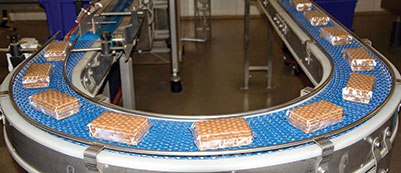Hygienic processing for the baking industry
- Like
- Digg
- Del
- Tumblr
- VKontakte
- Buffer
- Love This
- Odnoklassniki
- Meneame
- Blogger
- Amazon
- Yahoo Mail
- Gmail
- AOL
- Newsvine
- HackerNews
- Evernote
- MySpace
- Mail.ru
- Viadeo
- Line
- Comments
- Yummly
- SMS
- Viber
- Telegram
- Subscribe
- Skype
- Facebook Messenger
- Kakao
- LiveJournal
- Yammer
- Edgar
- Fintel
- Mix
- Instapaper
- Copy Link
Posted: 23 December 2014 | Bolletje | No comments yet
With a heritage dating back almost 150 years, Dutch family bakery Bolletje launched in the city of Almelo in 1867 and by 1927 had become one of the largest rusk-making factories in Holland. In today’s market, with sales based throughout Europe and more than 500 employees, Bolletje is one of the most recognisable brands in Europe with a range of successful products including rusks, crisp-breads, crackers, rye bread and toast, gingerbread, schuddebuikjes and cookies.


As with any food manufacturer, ensuring product quality and that hygiene standards are maintained are essential to the success of the business. Bolletje prides itself on its high quality products and it’s this attention to detail that sets the company apart from its competitors.
Complying with various hygiene regulations is critical but also presents a challenge for food manufacturers. However, as well as conforming to International Food Standards, Bolletje is both HACCP compliant and works in line with BRC Global Standards; guaranteeing the standardisation of quality, safety and operational criteria and ensuring the company is fulfilling its legal obligations and providing protection for the end consumer.
“In terms of hygiene and product quality, we work to high standards at our factory,” explains Bjorn Brokelman and Ramon Gerfen, Maintenance Engineers at Bolletje. “In addition to the actual processes complying with associated regulations, all of our employees are educated and re-trained regularly; ensuring they remain on the cusp of good practice. The materials used in our plants are also compliant to necessary guidelines and regulations; ensuring they are food safe.”
Food safety is one of the primary goals of the food processing industry and can only be achieved through the implementation of stringent sanitation practices. When it comes to conveying technology – which, as with many baking organisations, plays a large role in the production of Bolletje’s goods – it is imperative to ensure hygiene risks are dealt with. The role of a conveyor belt manufacturer is to offer products with features that can simplify and reduce the cleaning process, ensure they are protected against external contaminants and be compliant with food-grade standards; ensuring a perfect ratio between sanitation and efficiency.
Implementation of measures to obtain food safety often start with cleaning on a regular basis. Downtime for cleaning and maintenance, or repairs from breakdowns is costly, and must be limited as much as possible. The role of the conveyor belt manufacturers is to offer products with features that simplify and reduce the cleaning process to achieve a prefect ratio between sanitation and efficiency.
“We work with high level materials such as chain and synthetic belts, which ensure we are compliant with EU legislation and that our products maintain the highest standards of food safety,” explains Brokelman.
One of the key challenges with a bakery production line is ensuring that the elements of the process are harmonised. “Natural products must be kept within their tolerances and different machine tolerances should be noted and taken into account when designing the process,” says Brokelman. In ensuring these elements are dealt with, it’s useful for food manufacturers to work together with their suppliers. Grefen explains how working together can, in turn, ensure that the development of new technologies work in harmony with core processes.
To this end, belt specialist Ammeraal Beltech has developed a special conveyer belt for Bolletje’s rusk baking line to help improve the overall process. “For a process to be successful you need experience from both areas of the practice to work in collaboration,” says Grefen. “This is what we have achieved with Ammeraal Beltech. We have arranged for our engineers to attend a belt steering course with the goal of learning how we can extend our belt lifetime and increase unplanned stops because the belts are not running efficiently enough. The result is that the production line is efficient and remains hygienic. Ensuring a solid relationship between equipment manufacturers and suppliers is key to this success.”
Looking to the future, Brokelman explains that the industry is experiencing a major shift in the way products are being packaged. “We are presently working with static packaging machines, which have a little adjustment for different product packaging,” says Brokelman. “The next generation machines are working with a combination of two or three robot arms to ensure flexibility that can be easily shifted to new packaging to ultimately satisfy the customer.”









